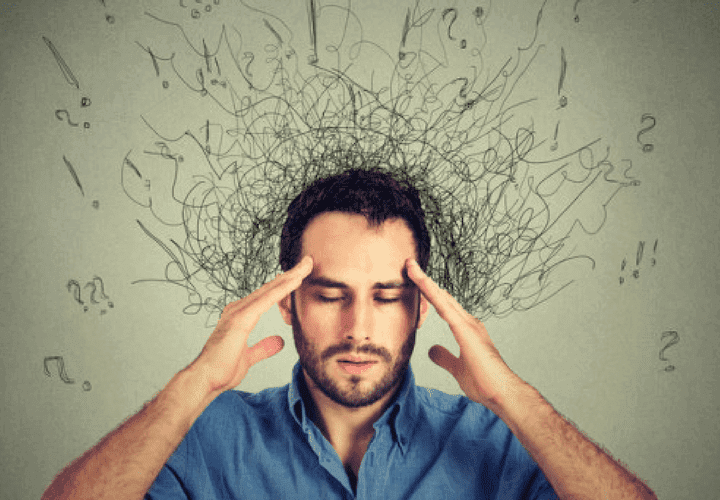Understand the Negative Effects of Stress


Reviewed and approved by the doctor Karla Henríquez
We often talk about stress, but not in a very specific manner. Because of this, we put all of our discomforts (mental and physical) into the same category. The label may be accurate, but it could lead us to forget about the true negative effects of stress.
You don’t have to be an expert to be able to identify the effects of stress. It’s all a matter of knowing your body, being conscience of your tendencies and, of course, being well informed. Remember, this information isn’t meant to overwhelm you. Instead, it should help you take care of yourself better.
The physiology of stress

Believe it or not, a little bit of stress is a good this.
This is because it’s a part of the fight-or-flight system. So, with a little bit of stress we increase our work pace and we end up being more efficient.
However, excess stress, or chronic stress, directly affects three systems in our body: the endocrine system, the nervous system and the immune system. From there, an impressive amount of negative effects can take place.
- Stress activates all of our brain’s compounds and causes a chain reaction.
- This causes hormone secretion and stimulates the hypophisis that, at the same time, secretes ACTH corticotropin.
- Then, corticotropin activates the adrenal glands and this triggers adrenaline production (epinephrine) and nor-adrenaline (norepirephrine) and corticosteroids (aldosterone) and glucocorticoids (cortisol).
This reaction and abnormal hormonal secretion affects all of the organs in the body, and also directly affects the immune system.

The phases of stress
Hans Selye, a doctor of endocrinology in Montreal, divided the body’s response to stress into three fundamental stages: alarm phase, resistance phase and exhaustion phase.
- Alarm phase. First, this phase is responsible for certain positive effects of stressful stimuli. In this phase, the sympathetic nervous system is activated. Adrenaline and nor-adrenaline secretion takes place which increases your concentration and attention capacity. The immediate effects can include arterial hypertension, increased cardiac rhythm and sweating. This phase should only last for a short time.
- Resistance phase. Next, this phase the consequence of the alarm phase lasting for longer than it should. At this point, metabolic changes take place and your organs start to suffer the negative effects of excitation of the nervous system and the resulting hormone secretion.
- Exhaustion phase. Finally, the body becomes altered by the imbalance of the implicated systems in response to the stress. Then, the symptoms that one experiences are the typical illnesses that those who are subject to stress tend to suffer from.
The Negative effects of stress
…On the digestive system
Among the main negative effects of stress on this system, you will find: stomach ulcers, irritable colon syndrome, ulcerous colitis, air fatigue, gastritis.
Also, it contributes to poor diet habits like untimely eating, eating junk food, not eating and other related behaviors.
…On the respiratory system
Stress can act on this system either directly or indirectly.
Indirectly, it can increase the one’s propensity to respiratory diseases because of the debilitating effect it has on the immune system. Directly, it can cause hyperventilation, dyspnoea, psychogenic asthma and a suffocating feeling.

…On the cardiovascular system
This is one of the systems that is most affected by stress, and some of its effects can have fatal results. Among these are: tachycardia, arteriosclerosis, angina pectoris, myocardial infarction, extrasystoles, chronic tachycardia, etc.
…On the muscles and skin
In this sense, stress can be masked with other causes. It can cause acne, psoriasis, pruritus, eczema, dermatitis, muscle cramps, pain, stiffness, hiccups and hyperreflexia, alopecia, etc.
…On the nervous system
Unfortunately, the negative effects of stress are so varied that they make us reflect on the lifestyle that we carry out and its consequences.
Stress may bring with it problems with anxiety, irritability, amnesia, irritability, amnesia, headaches, migraine, addictions, depression, sleep disorders, mental blocks, personality disorders, development of phobias and fears, even eating disorders, among others.
The negative effects of stress can lead to a loss of physical and mental integrity. We shouldn’t let our psycho-emotional health be compromised at this point. That is why we must look for tools and professional help in order to learn to understand ourselves, take care of ourselves and love ourselves more and move forward.
All cited sources were thoroughly reviewed by our team to ensure their quality, reliability, currency, and validity. The bibliography of this article was considered reliable and of academic or scientific accuracy.
- Biblioteca Nacional de Medicina de Estados Unidos. https://medlineplus.gov/spanish/ency/article/003211.htm
- VV.AA. (1993).Estrés, ansiedad y lectura: Eficiencia vs Eficacia. https://www.researchgate.net/publication/28269150_Estres_ansiedad_y_lectura_Eficiencia_vs_Eficacia
- VV.AA. (2012). Infarto agudo del miocardio por estrés laboral. https://www.scielo.sa.cr/scielo.php?script=sci_arttext&pid=S1409-00152012000200012#correspondencia1
This text is provided for informational purposes only and does not replace consultation with a professional. If in doubt, consult your specialist.








